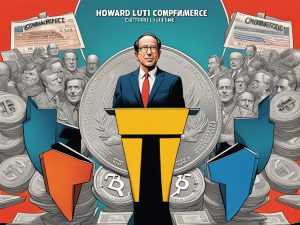Unlocking the Future of Web3: Opportunities for U.S. Government 🗽🚀
In a significant moment, U.S. government agencies have a chance to harness the transformative potential of web3 technologies. By taking targeted actions that promote innovation and decentralization, these agencies can provide regulatory clarity and protect consumers. Insights from a16z crypto outline specific initiatives that can be adopted without the need for new legislation, paving a way for leadership in the expanding crypto landscape.
Fostering a Culture of Innovation and Fairness 💡🤝
At the heart of advancing web3 is the necessity for American agencies to focus on competition and creativity. Historically, the tech sector in the U.S. has flourished thanks to startups that thrive in an environment that stimulates competitive innovations. It is essential for agencies to build frameworks that empower new market entrants, allowing startups to challenge established entities without facing excessive regulatory roadblocks.
Providing Clarity in Digital Asset Regulations 📜🔍
The role of the Securities and Exchange Commission (SEC) is pivotal in clarifying how digital asset transactions should be classified. By pursuing formal rulemaking processes, the SEC can establish clear guidelines for market participants. It is vital to define which transactions are classified as securities, as this clarity can strengthen the operational environment for digital assets for both businesses and consumers.
Streamlining Processes by Minimizing Intermediaries ⚙️✂️
The innovative nature of blockchain technology allows for a reduction in the reliance on third-party intermediaries, which poses challenges to existing regulatory structures. Current policies often rely on the assumption that centralized players are essential, a notion that does not apply to decentralized models. Agencies should evolve regulations to acknowledge the time and cost savings offered by blockchain transactions, ensuring that decentralization can progress without constraints from outdated regulatory frameworks.
Improving Transparency and Stakeholder Engagement 🎤🤔
For an effective regulatory approach to cryptocurrency, transparency in decision-making is essential. Agencies are urged to actively engage with various stakeholders, including industry leaders, academic experts, and the general public. This collaborative approach can result in more informed and balanced policies that promote growth and counterbalance the impact of special interests.
EncourAGING Government Adoption of Cryptocurrency 💼💰
Restrictions currently in place prevent U.S. government employees from utilizing cryptocurrencies, which limits their engagement with the technologies they are tasked with regulating. By allowing these employees to transact in cryptocurrencies, they could gain valuable insights and a deeper understanding, ultimately enriching policy development and execution.
Providing Specialized Education for Government Personnel 📚🛠️
For government officials to effectively oversee decentralized technologies, they need focused training in blockchain and related innovations. Such educational initiatives will empower them to make knowledgeable policy choices and leverage the transparency of blockchain to support regulatory objectives. Collaborating with industry experts and academic institutions can enhance the quality of this training, providing access to the latest research and knowledge.
Promoting Research and Development in Blockchain Technologies 🔬🔐
U.S. government bodies should back research efforts geared toward blockchain technologies to secure national interests and maintain competitiveness. Privacy-enhancing solutions, like zero-knowledge proofs, play an essential role in boosting data security while preserving individual privacy. These advancements can be key in protecting sensitive information and should be incorporated into governmental operations to foster efficiency and build public trust.
Hot Take: Seizing the Web3 Moment 🚀🔥
Through the execution of these recommendations, U.S. government agencies can emerge as frontrunners in the web3 revolution, ensuring that the nation maintains its status as a pioneer in crypto and blockchain technologies. By focusing on innovation, clarity, and strategic research, the government can successfully embrace and shape the future of decentralized technologies.





 By
By
 By
By
 By
By
 By
By
 By
By